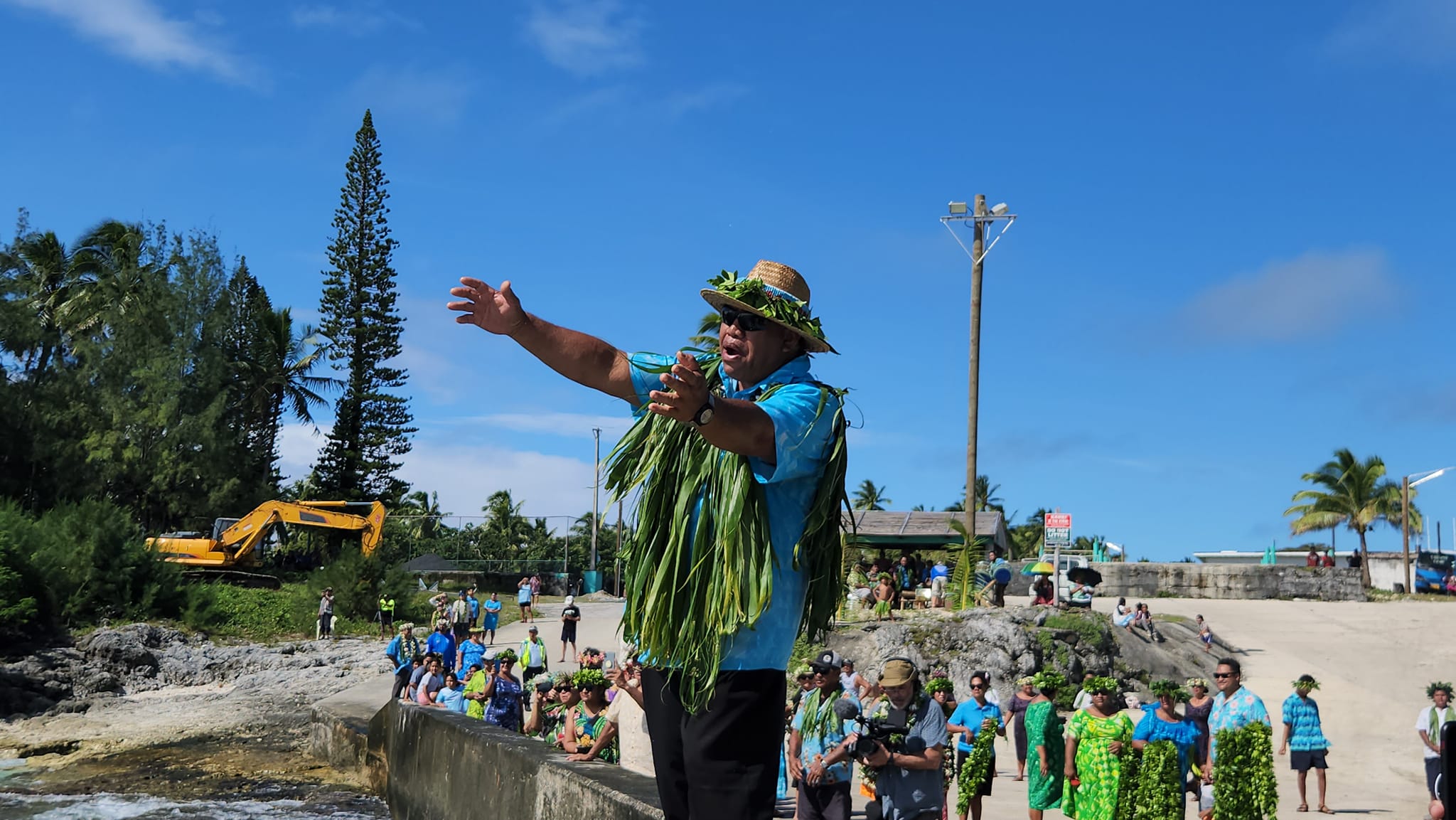Thomas Tarurongo Wynne :It’s time to learn to walk in two worlds
Saturday 29 April 2023 | Written by Thomas Tarurongo Wynne | Published in Editorials, Opinion

Mauke resident Teahui Tauu welcomes Vaka Paikea with a turou on Wednesday. AUNTY NAN/23042726
The arrival of the Vaka Paikea to Akatokomana, Mauke, is such a good example of where we can utilise the culture of today and culture of tomorrow and use both to advance ourselves into the challenges of the world, we now live in, writes Thomas Tarurongo Wynne.
With our Tama Ua, firmly placed within both worlds, both hulls – ki muri, the past and ki mua, the future – represents the advances of the modern world and the long and proud traditions of our past. Because when we harness both and walk in both, there is nothing we cannot do, no place we cannot voyage and no challenge or obstacle we cannot overcome. That much should be clear.
Modern day voyaging, be it on the Vaka Marumaru Atua, or Paikea, gives us as Cook Islands Maori the opportunity to do as former prime minister Sir Geoffrey Henry said in 1991 – Culture is not just the past – it is the present and the future. It is what we once were and what we strive to be.
In this modern day we learn to walk in two worlds, yet often it is a walk in one, and a small stride in the other. Like a man or woman with one large leg, and one small and weak, we try and traverse the world saying we walk in two, but the lived reality is we walk in one and sometimes two. But when we do walk in two, the walk is tall, strong, thriving and fit for purpose for 2023 and beyond.
Having now lived and worked in Aotearoa for the past three years, it is clear to me that the circle of learning and change has not come full circle and our people here need that desperately. Our families, our men and women left in the 1940s and through to today for work in the factories of a bustling New Zealand 1950s, and the freezing works in 2023 of a depleted New Zealand labour force, and as much as the benefit of access to money and education was at the front of our migrant population’s minds, the cost has been heavy and sometimes I wonder more then we consider if we consider these numbers from the 2018 New Zealand census.
Eighty-nine (89) per cent of our population that identify as Cook Islands Māori can only speak English and not hold a conversation in Cook Islands Māori. Close to 40 per cent identified no religious church affiliation. More than 80 per cent of our Cook Islands Māori population were now born in New Zealand, with most having never been to the Cook Islands, and as far as prosperity goes, the median income in 2018 for a Cook Islands Māori householder was just $22,500 and only 5 per cent earning over $70,000-$100,000.
We are a diverse population with close to 50 per cent also identify with another ethnicity, a young population with the average age being 21 years old and close to 20 per cent are under the age of 20. Thirty per cent had no formal qualifications with just 7 per cent having a Bachelors degree or higher. Around half of Pacific people lived in an owner-occupied dwelling in 1986, but now just over one-third with just 35 per cent of our people recorded as being home owners in 2018. This next set of data coming from the latest census will paint a new picture for us of where we as Pacific peoples and Cook Islands Māori are at so we can plan for the future ahead.
But what also is clear is it is time we take stock of the dreams we had as a migrant population and whether we have achieved these and if so where, and if not why not. This is the core of my current Masters research and I look forward to presenting that research when it is done to our communities here in Aotearoa.
What should be clear is that as our population now sits at 14,000 (in Cook Islands), and close to 100,000 in Aotearoa, is it time to again call our people to return home, and bring full circle the skills and labour, lessons and learnings, back home, instead of other economies enjoying the fruit of our sons and daughters’ labour.
My wife and I are returning home this season is just that, but it is the many I meet week in and week out that I think about and just how much our country could benefit from them, and more importantly how they could so benefit from what only our country, our culture, our language and our world view could offer them – deep within their sense of who they are, their identity and their being, and able to walk in two worlds and not just one, or stumbling in two.














































